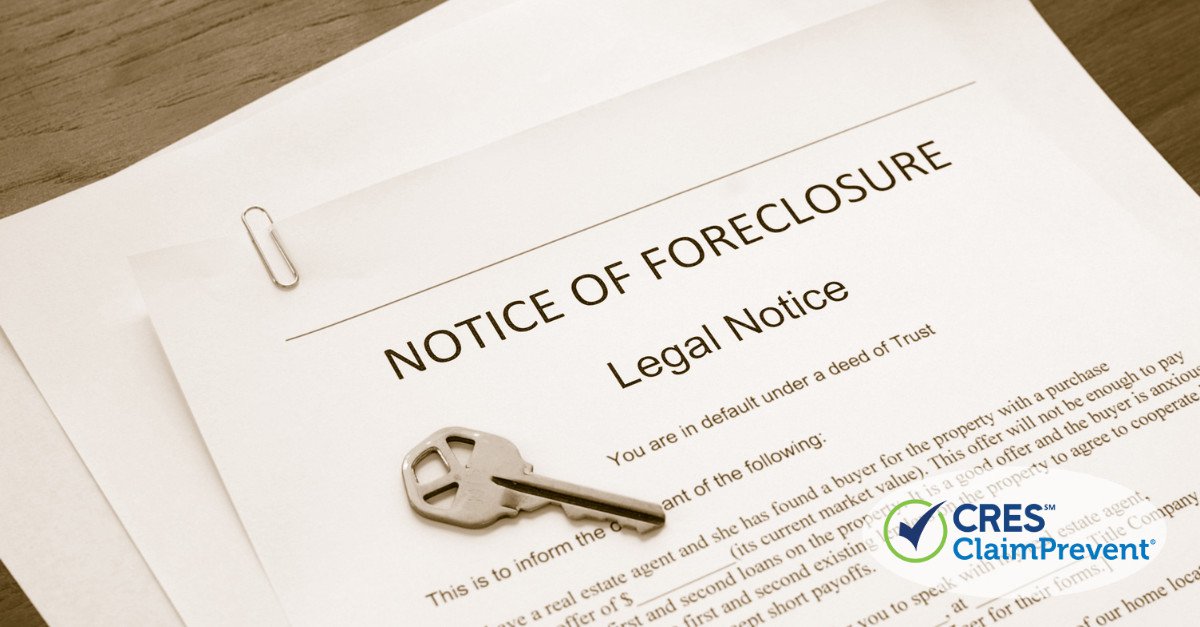When you list a foreclosure property, there are risks that can lead to lawsuits if those risks aren’t properly managed. Here’s what to watch out for and how you can keep yourself and your real estate business safer from claims…
Common Issues With Foreclosure Properties
A common issue with foreclosure properties is when a home is sold but a previous owner or tenant has not vacated. Another common issue with foreclosure properties is when the previous owners or tenants have failed to remove all of their belongings from the property. This can lead to significant inconvenience and costs for the incoming buyer, if there are large bulky items that require removal or disposal.
Foreclosure properties are sold “as is”, which also puts a burden on the buyer to do their due diligence. If this isn’t done sufficiently and there are unwelcome surprises, the new buyer may take action and make a claim.
If a buyer becomes disgruntled in these scenarios, of course, the former property owners faced foreclosure, so they are unlikely to have the money to pay any damages. The bank that sold the property most likely has a strong legal team to defend against lawsuits. Sometimes, the real estate licensee can find yourself on the hook for a lawsuit simply because you are the easier target.
Statutory Requirements
All licensees need to be aware of the statutory notice requirements for foreclosure properties. While this is the bank’s responsibility to comply with notice requirements, confirming this has been done correctly is good practice if you’re a licensee.
In California, for example, new owners of foreclosed properties must serve a three day written ‘notice to quit’. This means the foreclosed owner must move out in that timeframe. If they don’t, formal eviction proceedings ensue in court.
Tenants of foreclosure properties have special Federal protections. Federal law requires that tenants, in most cases, must be provided with 90 days’ notice before any eviction proceedings begin. This doesn’t apply if the tenants are relatives of the landlord. State and local laws provide additional protections for tenants. Where these protections are greater than the Federal laws, the State and local laws apply. Sometimes new owners offer ‘deals’ to pay tenants to exit the property earlier.
Tips for Licensees to Reduce the Risk & Avoid Claims
To avoid a lawsuit when listing and selling a foreclosure property, licensees can use these tips to minimize risks:
Ensure compliance with notice periods
Licensees should confirm that the appropriate notification requirements have been complied with by the seller/bank. You should seek confirmation in writing from the bank. Prior to marketing and selling the property, you may also wish to confirm that the former owner has actually received the notice. This extra step can help to prevent any future issues.
Communicate clearly to new buyers
New buyers need to understand the unique nuances of buying a foreclosure property. They are purchased ‘as is’. Encourage buyers (in writing, when possible) to conduct thorough independent inspections, so they fully understand the condition of the property and any necessary repairs. If a buyer undertakes a comprehensive due diligence process, this can ensure that there are fewer surprises post-purchase.
Be careful when dealing with tenants or previous owners
Real estate licensees should approach any dealings with owners or tenants in foreclosed properties with a high degree of caution. If you have not verified that they have received the appropriate notice yourself, as suggested above, you cannot automatically assume they have received it. Licensees should also understand that needing to move out of a property in the event of a foreclosure situation can be stressful for the previous owner or tenant. You are acting on behalf of the seller — the bank. But, high stress situations require an empathetic and professional approach.
See: Handling Real Estate Foreclosure Sales with Tenants.
Check before removing any property
Real estate licensees should check with the selling party/bank to ensure they have verified that any belongings left behind in the property are indeed ‘abandoned’. This can prevent cases where you are somehow involved in the disposal of items, but then a former resident sues you for destroying their property.
How to Handle a Tenant’s Abandoned Property.
CRES E&O Insurance Can Help Protect You If There’s a Lawsuit
Real Estate Errors and Omissions insurance is critical for real estate licensees to defend a claim. CRES E&O + ClaimPrevent® offers superior protection and access to expert real estate attorneys to help you prevent claims, not just defend them. Contact the CRES team at 800-880-2747 for a confidential discussion today. As part of one of the largest insurance brokers in the world, we have access to more E&O options than just about anyone.
